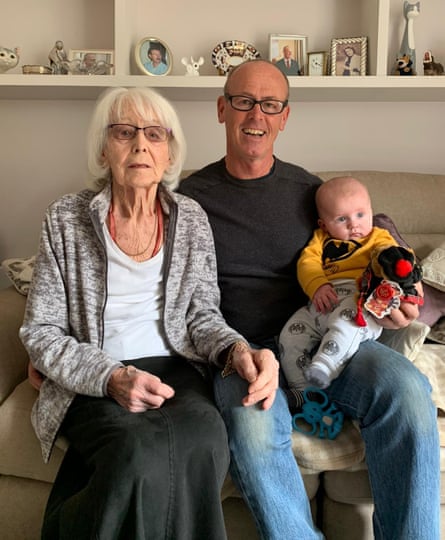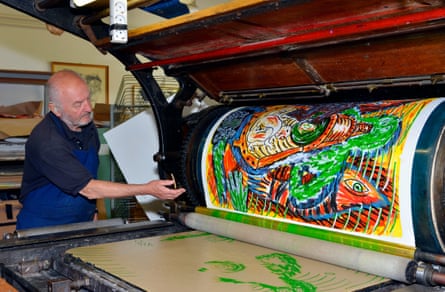A Guardian analysis has found that as many as one in three hospital beds in parts of England are occupied by patients who are well enough to be discharged, with a chronic lack of social care meaning many do not have suitable places to go. We spoke to some of those stuck in hospital.

‘My 91-year-old mother fell over trying to get to the toilet and fractured her hip’
My mother is 91 and has an Alzheimer’s diagnosis. She was admitted to Worthing hospital on 30 May after a minor fall. She was a bit confused but otherwise unhurt, just a bit shaken. Whilst in hospital, she caught Covid and had to be isolated, which she found distressing, and became increasingly disoriented.
She was declared medically fit to be discharged but no residential bed could be found for her. Then, in August, she was left unsupervised and fell over trying to get to the toilet and she fractured her hip, which required surgery. Whilst under the anaesthetic her wedding ring and another gold ring was taken off her finger and has not been seen since. I believe them to be stolen, but the hospital maintain that they are just “lost”.
Her hip was just about healed when she caught her shin between the side bars and the frame of the bed, cutting her shin so badly that she is being reviewed by a plastic surgeon to see if it needs a skin graft. Since the operation, my mum is pretty much bedbound and lives in a state of confusion and anxiety. Her physical health and mental wellbeing have deteriorated considerably in the almost five months she has spent in the care of the NHS. She spends all day practically trapped in bed, staring into space or with her eyes shut, just rocking to and fro. She has little mental stimulation.

During the time she has been in hospital, she has caught Covid, had to isolate twice, broken her hip and cut her shins four or five times on the bed frame, the last time seriously. She has been overmedicated, understimulated and often ignored. She has lost money, clothes, her mobile phone – later found, but not before I had to buy a replacement – her favourite pillow, which was like a comforter, her wedding ring and other jewellery.
Barry Long, 62, site manager from Hove in East Sussex

‘I saw first hand how broken the process is’
My father went to hospital on 3 October and was declared medically fit for discharge on 8 October. We were told a care package would be arranged as part of the discharge process and he would not be leaving hospital without it in place – ie carers visiting his home. Despite feeling guilty about him using a hospital bed unnecessarily, I was in a dilemma regarding taking him home and struggling to care for him alone, or holding out for someone to contact me to advise the care had been arranged. I was told if he left hospital without the plan there would not be any assistance.
No staff could update me or tell me who I needed to contact. I started to think I should seek care privately to get him home. I finally received a call from the care team on 15 October. I was told all care on discharge was means tested and asked if my dad’s finances were such that he had the means to pay for care. I told her my dad had been in hospital for a week more than necessary with no contact from anyone. She said the team would follow up on the 17th to discuss the care plan.

I took it upon myself to call Action for Carers to get advice and support and to call the social care team to try to progress a care plan. Action for Carers had a person dedicated to assist families and patients at the hospital. The decision was reversed and he was home with a care plan within 48 hours. He stayed 11 days more than necessary in hospital, blocking a bed and costing a fortune. I saw first hand how broken the process is and how much it costs blocking a bed, and the wider implications.
Amanda Bird, from Oxted in Surrey

‘I began to lose hope’
I was admitted to hospital because I had sepsis. I was given antibiotics and recovered. About 10 days later I caught Covid in hospital and had to spend a week in isolation.
I became very depressed and weak, almost unable to move at all. At night I was twice physically threatened by a patient suffering from dementia, who was wielding a walking frame. I was terrified, calling for help – it took a very long time for staff to respond and he was eventually subdued by four security staff. It was very difficult to sleep during my entire stay, but these events made sleeping almost impossible. My mental wellbeing was severely shattered.
Three ulcers developed on my foot due to being prone in a bedbound position. My wife noticed the ulcers when visiting, as the foot was exposed and not dressed. She was very shocked and tried through various methods to get my foot properly dressed. Even so, the dressing was hardly ever changed thereafter, and my foot became very painful. This is a dangerous situation because I am a diabetic – it would have been completely avoidable had there been sufficient staff, care and attention.
I then had to wait in hospital to be discharged. I received conflicting information, one person informed me that I was 26th on the list to be released for rehab placement. Another doctor told me I could be stuck here for months.
In the end I had to wait for over two weeks, trapped in a Goyaesque ward. The ward was very overcrowded. Most patients were very ill and bedbound, one or two were fit enough to go home – but were waiting to be discharged. I was only given two bed baths during my five-week stay, due to staff shortage, and developed two pressure sores. I began to lose hope.
I am very hard of hearing, so rely partly on lipreading. Staff did their best but were wearing masks, which made communication very difficult. My wife was invaluable, finding out progress and passing information on to me. There were very few staff and they were hugely overworked dealing with a multitude of issues – they did their best.
I was very unhappy to be bed blocking, knowing that others needed the nursing care. Release came as a surprise when I was told that I would be leaving the next day, destined for a rehab place at a care facility near to my home in Cromer.
I am still in a lot of pain and walking is still very difficult, the foot is now infected and I am on antibiotics.
Michael Horsley, 80, an artist from Cromer in Norfolk.
